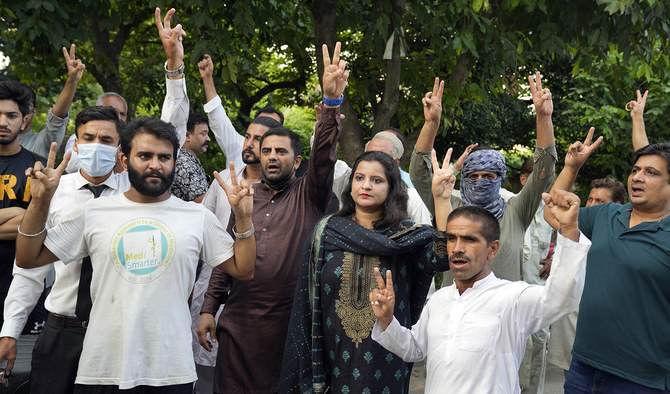LAHORE: Life continued to move at a normal pace in the eastern city of Lahore despite the high-profile arrest of former Pakistani prime minister Imran Khan on Saturday, following a court ruling that gave him a three-year imprisonment in a case involving the illegal sale of state gifts.
Khan had been facing criminal proceedings in the matter after the country's election commission barred him from holding public office in what is popularly called the Toshakhana case last October and referred the matter to the higher judiciary.
The Toshakhana, also known as the state repository, is a department under the Cabinet Division that stores gifts given to rulers and government officials by heads of other governments and foreign dignitaries. Khan was convicted after a trial court proclaimed he was guilty of "corrupt practices" and disqualified him from holding any public office for five years.
Earlier this year, when Khan was arrested from an Islamabad court by paramilitary Rangers on May 9, violent protests broke out in Lahore and other cities, during which many of his party supporters targeted government buildings and military installations and set them on fire.
However, the situation was completely different in the city this time, even as the former prime minister asked his supporters to keep "protesting peacefully" in a pre-recorded video that was circulated by his Pakistan Tehreek-e-Insaf (PTI) party shortly after his arrest from the Zaman Park residence.
“The Punjab Police had been preemptively arresting [PTI] workers, members, and well-wishers to avoid any groundswell of people,” Intazar Hussain Panjutha, one of Khan’s lawyers representing him in the Toshakhana case, told Arab News while describing these detentions as “absolutely illegal.”
He informed that the police arrived at the ex-premier’s residence at 12 pm, though the trial court’s verdict was announced nearly half an hour after that.
By Saturday afternoon, dozens of people outside Khan’s home had been whisked away in police vans. These vehicles could even be seen driving up to Zaman Park in the evening when there were practically no protestors or PTI sympathizers left.
There were no demonstrators at the Liberty Roundabout, near one of the city’s busiest shopping neighborhoods, which stood in sharp contrast to the situation in May when both Khan’s residence and the Liberty Market were dominated by PTI supporters clashing with Pakistan’s security forces.
There were no pitched battles or tear gas shelling this time.
Explaining the mute reaction to Khan’s arrest, Mian Muhammad Zulqarnain, a PTI member and Supreme Court advocate, said it primarily owed to the fact that the police had “preemptively” picked up people before they could utter a word against the government.
He pointed out it was the right of every citizen to voice political opinion and register protest.
“I saw no fires today, no vandalism, nothing burning, except for civil liberties and civil rights,” he said while alluding to the May 9 events and criticizing the state institutions. “Please explain to me how a law enforcement agency can issue a warrant over a phone call from Islamabad minutes after a judgment is passed? If you follow the due process, it takes time to implement an Islamabad court’s orders in the jurisdiction of Lahore.”
Zulqarnain said it was not surprising that people were questioning the timing of the arrest, which came only a week before the country’s national and provincial assemblies were scheduled to reach the end of their five-year constitutional term.
The former prime minister himself said it a number of times that the outgoing government and the country’s powerful military establishment were trying to keep him away from the national elections since they feared that his party was going to win hands down.
Arab News reached out to the Capital City Police Officer’s office in Lahore for comment but was asked to contact the Inspector General Police instead.
“Today’s developments have nothing to do with us,” said an official over the phone who did not identify himself. “Today, the office is closed. There is no PRO [public relations officer] you can talk to. We have no statement to make anyway.”















